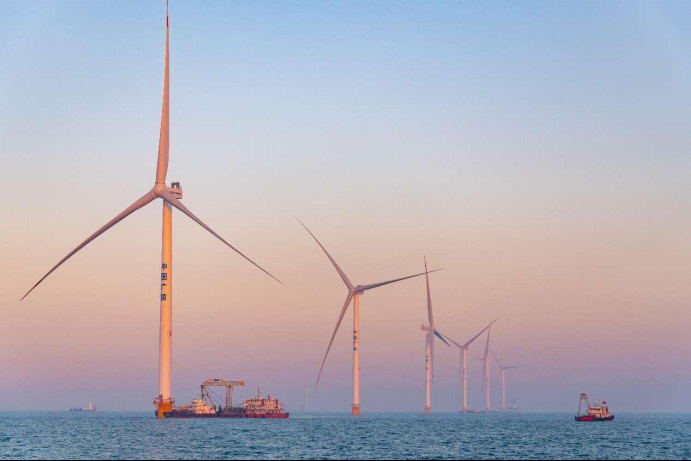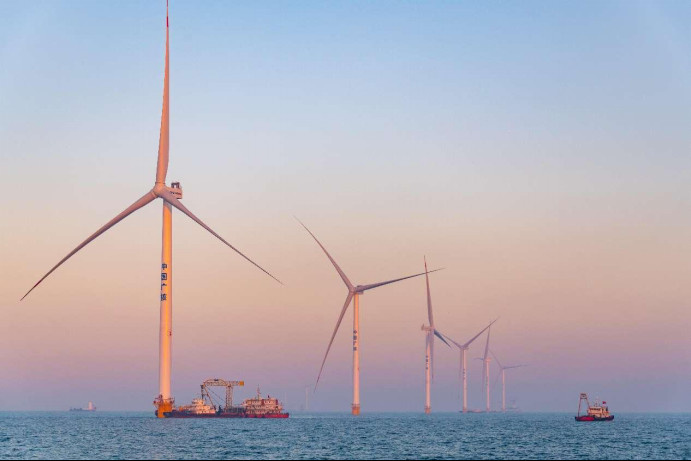Ding Yiting, People's Daily

Photo shows an offshore wind farm in Yantai, east China's Shandong province. (Photo by Zhang Weikang/People's Daily Online)
In the sea area of northern Fujian province of China, rows of hundred-meter-high white wind turbines spin steadily, delivering green energy to thousands upon thousands of households.
Recently, the world's first 16-megawatt offshore wind turbine was successfully connected to the grid here, taking China's offshore wind power development, manufacturing and operating capabilities to new heights.
By the end of 2022, China's cumulative installed capacity of offshore wind power exceeded 30 million kilowatts, ranking first globally for two consecutive years. This figure accounted for around half of the world's total.
The cumulative capacity was around 390,000 kilowatts at the end of 2012, and by the end of 2017, that figure surged to around 2.79 million kilowatts. This shows that despite a late start, China's offshore wind power has developed rapidly and entered a large-scale development phase.
There are several key features of the 16-megawatt offshore wind turbine. Its single blade is 123 meters long and the total sweep area of the blades is equivalent to the area of seven football fields. The turbine's hub is 152 meters in height, equivalent to the height of a 50-story building.
It can generate over 66 million kilowatt-hours of green electricity annually, which can meet the electricity consumption of 36,000 three-member households for a year.
The wind turbine has made important technological breakthroughs in the R&D and manufacturing of key core components such as ultra-long lightweight blades, large shaft bearings and miniaturization of ultra-large capacity generators.
From the 1.5-megawatt offshore wind turbine built in China's Bohai Sea in 2007 with blades shorter than 40 meters, to today's 16-megawatt offshore wind turbine, China's offshore wind power growth has been marked by a progression toward larger units.
According to Yu Chenguang, general manager of the offshore business unit of Goldwind, a global leader in clean energy, energy conservation, and environmental protection, 125 wind turbines each with a power generation capacity of 8 megawatts are needed to sustain the operation of a one-million-kilowatt offshore wind project.
Only 63 wind turbines each with a power generation capacity of 16 megawatts are needed to support the same project, Yu added, saying that this reduces the area of sea demanded by over 35 percent and foundation costs by over 40 percent.
Besides, the 16-megawatt wind turbine increases energy capture efficiency, generating over 6 percent more electricity than two 8-megawatt turbines combined, Yu said. Overall, the cost of electricity generation can be reduced by about 12.5 percent.
This is just an epitome of China's rapid development of the offshore wind industry.
Qin Haiyan, secretary general of the Chinese Wind Energy Association, said China now has independent capabilities in offshore wind turbine design, R&D, manufacturing, installation, commissioning and operation.
China's production of generators, wheel hubs, and towers, along with key components such as blades, gearboxes and bearings, accounts for over 70 percent of the global market.
In September 2022, Baihetan, an independently built offshore wind power installation platform with a lifting capacity of 2,000 tons, was delivered and put into operation, greatly enhancing offshore wind turbine construction and installation capabilities.
Relying on large-scale development and technological progress, the economic efficiency of offshore wind power has been greatly improved.
Qin said from 2010 to 2021, the cost of generating electricity with offshore wind farms dropped by nearly 56 percent, adding that the average kWh cost of offshore wind power projects has been lowered to about 0.33 yuan (about $0.05) at present, and the cost will be as low as other sources of electricity by 2025.
China's offshore wind power enjoys broad development prospects.
There are abundant resources for its development. China has around 18,000 kilometers of mainland coastline, with rich offshore wind energy resources.
"Around 2.78 billion kilowatts of wind resources can be exploited in wind farms located in waters up to 200 km from the coast, with depths less than 100 meters, and up to 150 meters above sea level. The resources span both nearshore waters along the coast and distant waters farther offshore," Qin said.
"At present, the cumulative installed capacity of offshore wind turbines is only more than 30 million kilowatts, and the utilization rate is less than 1.1 percent. The future development potential is huge," Qin added.
China's eastern and coastal areas lead the country in power consumption, but other energy resources are mainly concentrated in the western and northern regions. Developing offshore wind power projects off the coast enables the coordinated use of various energy resources.
Recently, the world's first 16-megawatt offshore wind turbine was successfully connected to the grid here, taking China's offshore wind power development, manufacturing and operating capabilities to new heights.
By the end of 2022, China's cumulative installed capacity of offshore wind power exceeded 30 million kilowatts, ranking first globally for two consecutive years. This figure accounted for around half of the world's total.
The cumulative capacity was around 390,000 kilowatts at the end of 2012, and by the end of 2017, that figure surged to around 2.79 million kilowatts. This shows that despite a late start, China's offshore wind power has developed rapidly and entered a large-scale development phase.
There are several key features of the 16-megawatt offshore wind turbine. Its single blade is 123 meters long and the total sweep area of the blades is equivalent to the area of seven football fields. The turbine's hub is 152 meters in height, equivalent to the height of a 50-story building.
It can generate over 66 million kilowatt-hours of green electricity annually, which can meet the electricity consumption of 36,000 three-member households for a year.
The wind turbine has made important technological breakthroughs in the R&D and manufacturing of key core components such as ultra-long lightweight blades, large shaft bearings and miniaturization of ultra-large capacity generators.
From the 1.5-megawatt offshore wind turbine built in China's Bohai Sea in 2007 with blades shorter than 40 meters, to today's 16-megawatt offshore wind turbine, China's offshore wind power growth has been marked by a progression toward larger units.
According to Yu Chenguang, general manager of the offshore business unit of Goldwind, a global leader in clean energy, energy conservation, and environmental protection, 125 wind turbines each with a power generation capacity of 8 megawatts are needed to sustain the operation of a one-million-kilowatt offshore wind project.
Only 63 wind turbines each with a power generation capacity of 16 megawatts are needed to support the same project, Yu added, saying that this reduces the area of sea demanded by over 35 percent and foundation costs by over 40 percent.
Besides, the 16-megawatt wind turbine increases energy capture efficiency, generating over 6 percent more electricity than two 8-megawatt turbines combined, Yu said. Overall, the cost of electricity generation can be reduced by about 12.5 percent.
This is just an epitome of China's rapid development of the offshore wind industry.
Qin Haiyan, secretary general of the Chinese Wind Energy Association, said China now has independent capabilities in offshore wind turbine design, R&D, manufacturing, installation, commissioning and operation.
China's production of generators, wheel hubs, and towers, along with key components such as blades, gearboxes and bearings, accounts for over 70 percent of the global market.
In September 2022, Baihetan, an independently built offshore wind power installation platform with a lifting capacity of 2,000 tons, was delivered and put into operation, greatly enhancing offshore wind turbine construction and installation capabilities.
Relying on large-scale development and technological progress, the economic efficiency of offshore wind power has been greatly improved.
Qin said from 2010 to 2021, the cost of generating electricity with offshore wind farms dropped by nearly 56 percent, adding that the average kWh cost of offshore wind power projects has been lowered to about 0.33 yuan (about $0.05) at present, and the cost will be as low as other sources of electricity by 2025.
China's offshore wind power enjoys broad development prospects.
There are abundant resources for its development. China has around 18,000 kilometers of mainland coastline, with rich offshore wind energy resources.
"Around 2.78 billion kilowatts of wind resources can be exploited in wind farms located in waters up to 200 km from the coast, with depths less than 100 meters, and up to 150 meters above sea level. The resources span both nearshore waters along the coast and distant waters farther offshore," Qin said.
"At present, the cumulative installed capacity of offshore wind turbines is only more than 30 million kilowatts, and the utilization rate is less than 1.1 percent. The future development potential is huge," Qin added.
China's eastern and coastal areas lead the country in power consumption, but other energy resources are mainly concentrated in the western and northern regions. Developing offshore wind power projects off the coast enables the coordinated use of various energy resources.
 Menu
Menu
 China sees rapid offshore wind power development
China sees rapid offshore wind power development
















